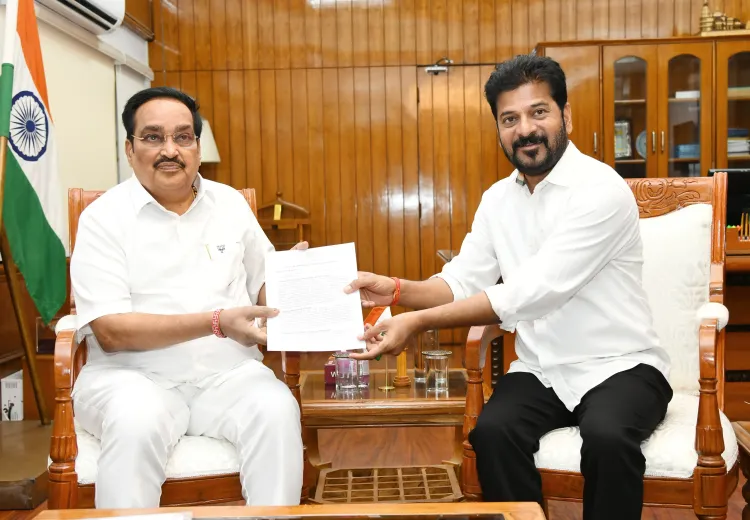Revanth Reddy Advocates for Equitable Krishna Water Allocation for Telangana

Synopsis
Key Takeaways
- CM Revanth Reddy demands equitable water allocation.
- 70% of Krishna water should be assigned to Telangana.
- Union Minister urged to expedite necessary project clearances.
- Telemetry system proposed for better water monitoring.
- Concerns raised over Andhra Pradesh’s water over-extraction.
Hyderabad, March 3 (NationPress) The Chief Minister of Telangana, A. Revanth Reddy, on Monday called upon Union Jal Shakti Minister C. R. Patil to ensure a just allocation of Krishna River water for his state.
Since the Krishna basin comprises 70 percent of Telangana and 30 percent of Andhra Pradesh, the Chief Minister urged Patil to assign 70 percent of Krishna water to Telangana.
Revanth Reddy, accompanied by Irrigation Minister N. Uttam Kumar Reddy and Nalgonda MP Raghuveer Reddy, met with Patil in New Delhi to discuss matters concerning Krishna and Godavari water resources.
The delegation requested the Union Minister to protect Telangana's rights in the distribution of Krishna and Godavari river water.
CM Revanth Reddy highlighted the unilateral decision made by the Krishna River Management Board, which allocated 66 percent of water to Andhra Pradesh and 34 percent to Telangana, despite a significant portion of the Krishna River's catchment area being within Telangana.
He urged the Union Minister to consider Andhra Pradesh's projects on the Godavari River only after determining Telangana's rightful share in Godavari water.
Emphasizing that Telangana has faced injustice for years, the CM pointed out that Andhra Pradesh is exceeding its water allocations this year as well, and requested the Union Minister to ensure that Andhra Pradesh does not draw more water than its entitled share in the future.
Revanth Reddy informed Patil about the critical need to implement Telemetry promptly to monitor water usage from Krishna River projects and expressed Telangana Government’s willingness to bear the costs associated with this system if necessary.
The CM also brought to the attention of the Union Minister the submission of the Detailed Project Report (DPR) for the Palamuru-RangaReddy lift irrigation project to the Centre in 2022 and the ongoing delays in receiving approvals.
He noted that permissions have only been granted for Upper Bhadra, which is currently under judicial review, while the necessary approvals for the Sitarama Lift Irrigation and Sammakka Sagar barrages remain pending. The Union Minister was asked to expedite the required clearances from the Central Water Commission (CWC) and the Technical Advisory Board (TAC) for these three projects.
Furthermore, the Chief Minister informed the Jal Shakti Minister that the Andhra Pradesh government has developed the Godavari-Banakacherla interlinking project in violation of the Andhra Pradesh Reorganisation Act and without obtaining necessary clearances from the CWC, Godavari River Management Board (GRMB), and KRMB.
Given that the Sitarama Lift Project and Sammakka Sagar Project on the Godavari River are still awaiting approvals, the CM requested the Union Minister to grant these clearances and finalize Telangana's assured water share in Godavari without delay. He reminded that Telangana risks losing ayacut stabilisation if these projects remain unapproved, as the state has already suffered injustice concerning Krishna water.
The Chief Minister explained that the AP Godavari-Banakarla project has not been discussed in the Apex Council, which is composed of the Chief Ministers of both states. He made it clear to the Union Minister that the Telangana government will not waver in its commitment to protect its water resources.










